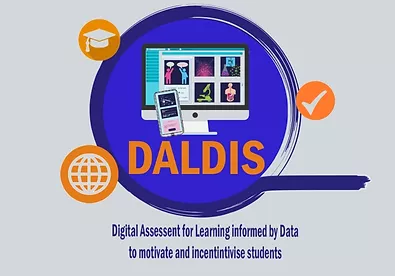
Digital Assessment for Learning informed by Data to motivate and incentivise students
The DALDIS project comprising 8 partners will address open access e-assessment for learning through the application and dissemination of innovative assessment for learning techniques which are established in different curriculum contexts and then tested in schools in 6 European countries.
Innovative data analysis processes will be applied to support learners and teachers, and to evaluate the most effective questioning and learning models. The project, based on Study Quest technology (www.study-quest.com), will drive student learning progression using well designed question sets and student feedback to help the student build their knowledge and understanding and support the investigation of key curriculum concepts. The key objective is to evaluate ‘assessment for learning (AFL) informed by feedback using digital technology in 6 countries with a focus on Science teaching and learning (Physics, Chemistry, Biology and Earth Science), and modern foreign languages (through the teaching of English and French) in years 5 through 9.
Needs
The increasing use of technology within education impacts many aspects of learning including assessment. Good assessment practices are essential for learning and teaching and the use of technology has been demonstrated to improve assessment at various levels (JISC, 2007). E-assessment which refers to the use of technology to assist assessment has a number of benefits when compared to paper based system such as cost reductions (James, 2016), the ability to assess more learners (Jordan, 2009), time saving as a result of marker automation (Ras, Whitelock, & Kalz, 2015), increased frequency of assessment (Sclater, 2007); adaptive testing (Fluck, Pullen, & Harper, 2009), and greater personalisation (Gusev & Armenski, 2014). Some of the most important features of a robust e-assessment system include ease of use and accessibility, interoperability, security and effective feedback features that can provide vital information to students and teachers alike. A well designed e-assessment system will also provide functionalities to manage student assessment data such as background statistical information and analysis.o.
Needs
The increasing use of technology within education impacts many aspects of learning including assessment. Good assessment practices are essential for learning and teaching and the use of technology has been demonstrated to improve assessment at various levels (JISC, 2007). E-assessment which refers to the use of technology to assist assessment has a number of benefits when compared to paper based system such as cost reductions (James, 2016), the ability to assess more learners (Jordan, 2009), time saving as a result of marker automation (Ras, Whitelock, & Kalz, 2015), increased frequency of assessment (Sclater, 2007); adaptive testing (Fluck, Pullen, & Harper, 2009), and greater personalisation (Gusev & Armenski, 2014). Some of the most important features of a robust e-assessment system include ease of use and accessibility, interoperability, security and effective feedback features that can provide vital information to students and teachers alike. A well designed e-assessment system will also provide functionalities to manage student assessment data such as background statistical information and analysis.o.
Project Results
1. Pilot results and evaluation reports
2. Curriculum aligned question sets in five languages
3. Technology upgrades to support needs of schools in participating countries
4. Software UI translated to five languages
5. A data analysis report outlining findings on effectiveness of methods
6. Training materials and online user help in five languages
7. A website with pilot and evaluation results, reports and the training and online user help
Find out more at the project’s website: https://www.daldis.eu/
